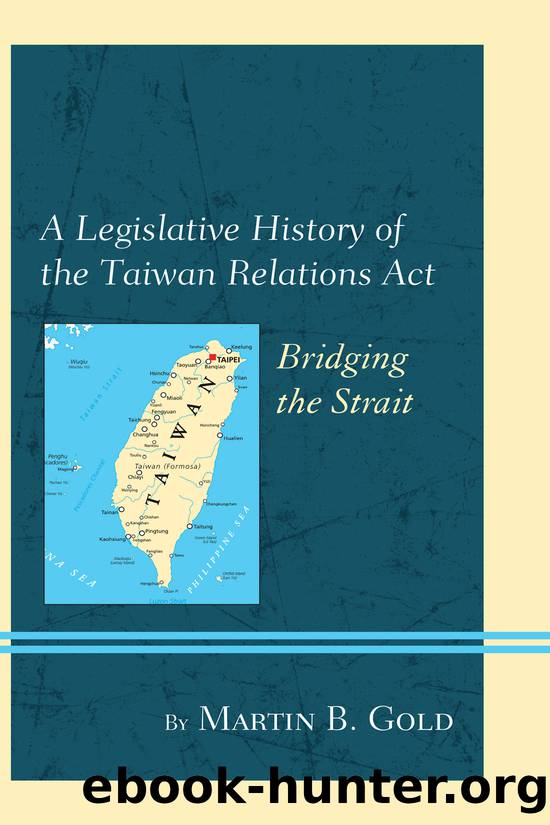A Legislative History of the Taiwan Relations Act by Gold Martin B.;

Author:Gold, Martin B.;
Language: eng
Format: epub
Publisher: Lexington Books/Fortress Academic
Chapter 6
Hearings in the House Committee on Foreign Affairs
PROCEEDINGS OF FEBRUARY 7, 1979, MORNING SESSION
As Church wrapped up his hearings on S. 245 at the Senate Foreign Relations Committee, counterpart proceedings on H.R. 1641 began in the House.
On February 7, 1979, in Room 2172 of the Rayburn House Office Building, Chairman Clement Zablocki (D-WI) convened the first of two days of hearings regarding Taiwan. Elected to the House in 1948, Zablocki served until his death on December 3, 1983. For his last seven years, he chaired the Foreign Affairs Committee. A supporter of Kennedy-Johnson Vietnam policies, Zablocki later had misgivings about the war. Along with Senator Javits, Zablocki was a principal author of the 1973 War Powers Resolution, which limited Presidential authority to introduce U.S. forces into combat.
The Committeeâs Ranking Member was Representative William Broomfield (R-MI), then near the end of a long tenure in Congress. Broomfield served from 1957 until he retired in 1993, including eighteen years as the senior Republican on Foreign Affairs. Broomfieldâs time in Congress came during a protracted period of Democratic control of the House. At no point in his thirty-six year career was he in the majority.
The structure of Zablockiâs hearings would resemble Churchâs. Administration witnesses would appear initially, followed by testimony from Members of the House, and then from private-sector experts. And, as at the Senate, questions from committee members would follow after witness testimony.
Witnesses appearing before Zablocki generally paralleled those who earlier testified at the Senate Foreign Relations Committee. The first panel included Warren Christopher, Deputy Secretary of State; Herbert Hansell, the State Departmentâs Legal Adviser; John Thomas, Assistant Secretary of State for Administration; and Harvey Feldman, the U.S. Department of Stateâs Special Coordinator for Taiwan.
Christopher was once again the Administration point man. He spoke optimistically about security and economic advantages of the new Asia policy. âFull and normal relations will allow us to work more effectively toward a stable system of independent nations in Asia. It will permit us to encourage an outward-looking China to play a constructive role in the world generally. And it will enable American business to deal on an equal footing with other suppliers as China moves forward toward modernization.â1
These were consequential developments, but it was important they come together without prejudice to Taiwan interests. Christopher detailed what the President had done to prevent harm to Taiwan:
â¢All existing treaties and agreements, apart from the Mutual Defense Treaty, would remain in force.2 Christopher added that during his December 1978 visit to Taiwan, he received commitments from Taiwan authorities that they also would continue those agreements.
â¢The President issued his December 30, 1978, order to agencies that U.S. programs relating to Taiwan were to remain active pending enactment of specific legislative authorization.
â¢The American Institute on Taiwan was incorporated.
â¢The Administration submitted enabling legislation, which Church and Zablocki had introduced by request in each chamber. The House bill number was H.R. 1614. Its text was identical to that of S. 245.3
Even though the bill excluded reference to Taiwanâs security, Christopher addressed the issue.
Download
This site does not store any files on its server. We only index and link to content provided by other sites. Please contact the content providers to delete copyright contents if any and email us, we'll remove relevant links or contents immediately.
| Arms Control | Diplomacy |
| Security | Trades & Tariffs |
| Treaties | African |
| Asian | Australian & Oceanian |
| Canadian | Caribbean & Latin American |
| European | Middle Eastern |
| Russian & Former Soviet Union |
The Secret History by Donna Tartt(18261)
The Social Justice Warrior Handbook by Lisa De Pasquale(11968)
Thirteen Reasons Why by Jay Asher(8488)
This Is How You Lose Her by Junot Diaz(6470)
Weapons of Math Destruction by Cathy O'Neil(5871)
Zero to One by Peter Thiel(5515)
Beartown by Fredrik Backman(5379)
The Myth of the Strong Leader by Archie Brown(5253)
The Fire Next Time by James Baldwin(5039)
How Democracies Die by Steven Levitsky & Daniel Ziblatt(4977)
Promise Me, Dad by Joe Biden(4919)
Stone's Rules by Roger Stone(4879)
100 Deadly Skills by Clint Emerson(4711)
A Higher Loyalty: Truth, Lies, and Leadership by James Comey(4574)
Rise and Kill First by Ronen Bergman(4558)
Secrecy World by Jake Bernstein(4416)
The David Icke Guide to the Global Conspiracy (and how to end it) by David Icke(4412)
The Farm by Tom Rob Smith(4339)
The Doomsday Machine by Daniel Ellsberg(4260)
